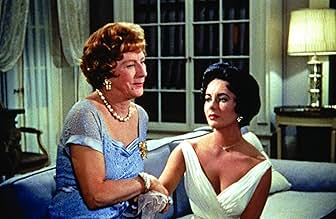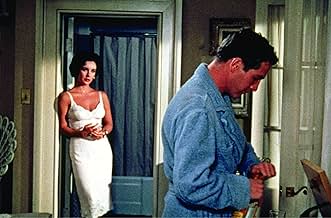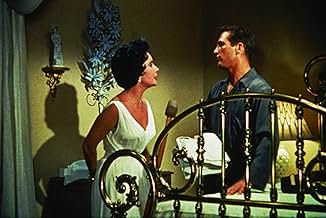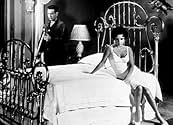Brick, um ex-jogador de futebol alcoólatra, bebe seus dias e resiste ao carinho de sua esposa, Maggie. Seu encontro com o pai, o Big Daddy, que está morrendo de câncer, acumula muitas lembra... Ler tudoBrick, um ex-jogador de futebol alcoólatra, bebe seus dias e resiste ao carinho de sua esposa, Maggie. Seu encontro com o pai, o Big Daddy, que está morrendo de câncer, acumula muitas lembranças e revelações para o pai e o filho.Brick, um ex-jogador de futebol alcoólatra, bebe seus dias e resiste ao carinho de sua esposa, Maggie. Seu encontro com o pai, o Big Daddy, que está morrendo de câncer, acumula muitas lembranças e revelações para o pai e o filho.
- Direção
- Roteiristas
- Artistas
- Indicado a 6 Oscars
- 3 vitórias e 16 indicações no total
- Sookey
- (não creditado)
- Boy
- (não creditado)
- Buster
- (não creditado)
- Child
- (não creditado)
- Dixie
- (não creditado)
- Pollitt Groom
- (não creditado)
- Party Guest
- (não creditado)
- Trixie
- (não creditado)
- Sonny
- (não creditado)
- Lacey
- (não creditado)
- Direção
- Roteiristas
- Elenco e equipe completos
- Produção, bilheteria e muito mais no IMDbPro
Avaliações em destaque
Paul Newman and Elizabeth Taylor are both brilliant as Brick and Maggie Pollitt, respectively. Not very often is there a screen couple that have the same chemistry together that they do.
Newman, however, steals the show. If you watch "Cat on a Hot Tin Roof" for nothing else, watch it for his performance. One of the greatest actors of all time, Newman showcases how powerful an actor he can be. This is not to say the supporting cast isn't excellent. Burl Ives is superb in a supporting role as Big Daddy, a man who's greatest concern is having his legacy live on after him. The sequence with Ives and Newman in the basement of the house remains one of the most incredible displays of acting I have ever seen.
"Cat on a Hot Tin Roof" is a very appropriate title. It is a searing, wonderfully acted film that I will not soon forget. I recommend those who haven't seen it yet to rent it as soon as they get a chance. A true classic.
Three of the greatest cinematic performances placed on film.
The casting is brilliant:
Tennessee Williams's Big Daddy was indeed big - larger than life, domineering, insensitive, self-absorbed. Burl Ives's Big Daddy is larger than life, insensitive, domineering, self-absorbed. Ives is "on" every moment. And every moment is true.
Paul Newman's Brick, is as afraid of life as Big Daddy is in love with it. Yet, in his way, he's a chip off the old block - self-absorbed, insensitive.
And domineering or, as Big Daddy and Maggie would have it, masterful, ready to take charge -
if he could just get over himself.
I confess, I don't care for Elizabeth Taylor as an actress, but she is so right for the part, that I can't think of anyone else to fill it. Anyway, who else has eyes that could compete with Newman's?
Judith Anderson plays the typical Williams matron, living in her house of delusions. She's Big Daddy's tormented, desperately lonely, unloved partner, who towards the end wins Big Daddy with her nobility and devotion.
The under-appreciated Jack Carter has the unenviable role of Brick's pliant, conformist brother, Gooper, decent at heart but worn out after years of jumping through Big Daddy's hoops and still winding up on the short end, with a house full of brats, bred at Big Daddy's presumed bidding and delivered by a scheming, ambitious weasel of a wife. Gooper the only character I have a little trouble with, because his climactic speech, as rendered by Carter, is so heartfelt, that we are aggrieved with him at the injustice of Big Daddy's favoritism for the no-account but aesthetically more pleasing Brick.
Perhaps an even more unenviable role is that of Gooper's wife, played to perfection by Madeleine Sherwood. Anyone who has grown up in the South has known "Sister Woman". I can assure those who haven't, that this character is not a stereotype or caricature.
There are a few quibbles. One character, the family doctor, though played well by Larry Gates, has a dramatic function that's about as useful as the referee in a pro wrestling match, but not nearly as decorative. I guess he's included to provide plot information, but I think it could have been provided just as well without him. I was also put off by the contrived thunder claps at dramatic moments. Then, there were some continuity problems, such as different facial expression when shot angles were changed and Gooper's too many "Shut ups" to Sister Woman.
If, as another reviewer has said, Tennessee Williams hated this film, then it couldn't have been because it was untrue to his work. If he disliked the changes and omissions, he should blame '50s prudishness, not the film, for dictating, say, the suppression of Brick's homosexuality.
Williams wrote about lies and delusions, the good ones and bad ones. Well, that's what Cat on a Hot Tin Roof and Streetcar Named Desire and Glass Menagerie were all about. Tennessee Williams's stories about the South and its culture of delusion are not just rebukes of Southern hypocrisy and bloodymindedness but paeans to the gentle and genteel refuge which delusion provides. As Maggie "The Cat" says, "Truth, truth - everybody keeps hollerin' about the truth. Well, the truth is as dirty as lies."
Finally, I think it was brilliant of Richard Brooks to insist on color, for Williams's stuff is talky, and with the drabness of a typical Williams set, this can be a bit oppressive. With color, and the wonderful animation Brooks instills in all the characters, his Cat contains not a dull moment. If Brooks has given us something at odds with what Williams intended, I think he has given us something just as fine.
As with all theatrical adaptations, many of the scenes are excessively talky, especially the Brick/Big Daddy scenes in the second act. Some of the highlights are just as wordy but thoroughly enjoyable rather than tedious (especially Maggie's story about Mae's reign as Cotton Carnival Queen and the entire scene in the basement). All of the performances are excellent, though Paul Newman as Brick is less flashy; it's not really until the basement scene that one feels his talent is given a workout. Elizabeth Taylor is an emotional rollercoaster, venturing from flirtatious to hectoring to wheedling to calm to grasping to tender, often within a single scene, and yet she never slips the rails. Watching films from this period (her career peak), one wonders what happened to turn her into the vague, bleary-eyed woman we see today. Judith Anderson's Big Mama is loud, coarse, and bossy, but completely sympathetic both in the scene with the birthday cake and in the confrontation scene at the end. When Big Daddy invites her along with him at the end, it is every bit as welcome to the viewer as it is to her. Burl Ives is the most towering of all; the emotional growth in the film is as much his as it is Brick's. Jack Carson and Madeleine Sherwood are every bit as good despite being relegated to comic relief at times.
My favorite aspect of this story, however, is the social dynamic. Brick and Maggie are spoiled, young, "beautiful people" who have yet to take on any responsibility, while Gooper and Mae are the epitome of a serious young family. Brick is an alcoholic former football player, while Gooper is a corporate lawyer. Despite these obvious differences, however, both their parents and the audience (and Tennessee Williams, obviously) clearly prefer Brick and Maggie. Every aspect of Gooper and Mae's personalities, even those which bespeak traditional values, are portrayed as petty and unimaginative. Even if one believes that Gooper and Mae have done all the right things, they have done them for the wrong reasons. Thus the theme of the story is most clearly presented: all that is important is to love and to express that love.
Você sabia?
- CuriosidadesDespite being really affected by her husband Mike Todd's death, Elizabeth Taylor resumed her job in a very professional way, without any delay on the set. Everyone was astonished by her determination.
- Erros de gravaçãoAfter Brick tries to drive away and gets stuck, Maggie goes out to him and helps him into the house through the pouring rain. Her hair is soaking wet, but the next time she is seen, it's perfectly dry and styled.
- Citações
Harvey 'Big Daddy' Pollitt: I've got the guts to die. What I want to know is, have you got the guts to live?
- ConexõesEdited into Hollywood: The Dream Factory (1972)
Principais escolhas
Detalhes
- Data de lançamento
- País de origem
- Idioma
- Também conhecido como
- Un gato sobre el tejado caliente
- Locações de filme
- Metro-Goldwyn-Mayer Studios - 10202 W. Washington Blvd., Culver City, Califórnia, EUA(studio: made in Hollywood, U.S.A. by)
- Empresa de produção
- Consulte mais créditos da empresa na IMDbPro
Bilheteria
- Orçamento
- US$ 3.000.000 (estimativa)
- Faturamento bruto mundial
- US$ 1.872
- Tempo de duração
- 1 h 48 min(108 min)
- Cor
- Proporção
- 1.85 : 1
































